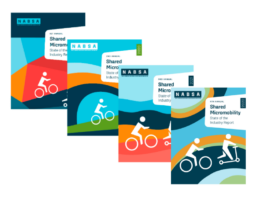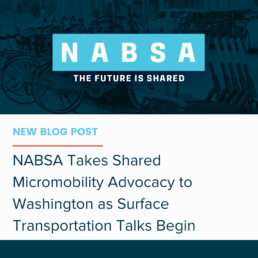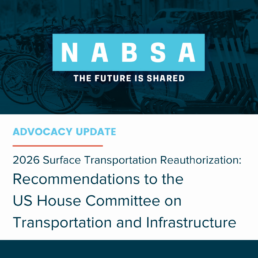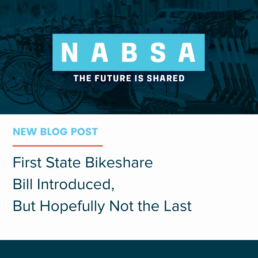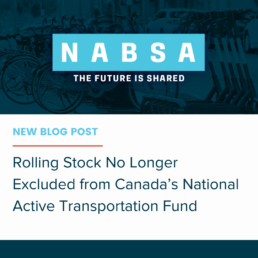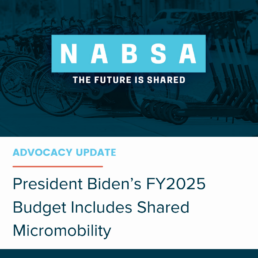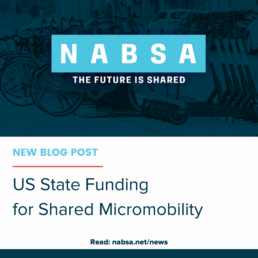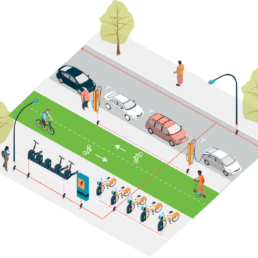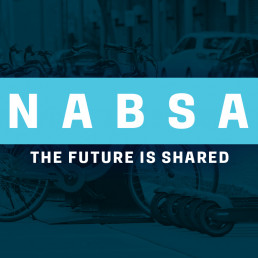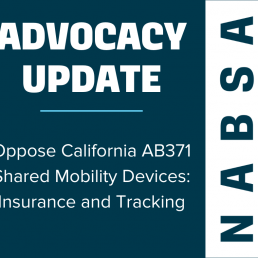Advocacy Toolkit
Resources and guidance to help you advocate for shared micromobility.
NABSA’s Advocacy Toolkit serves as a resource and guidance for our members and shared micromobility stakeholders interested in advocating for the expansion of shared micromobility systems in communities. The toolkit contains public documents and exclusive member resources that can aid in speaking about shared micromobility and its benefits to communities with policymakers and key stakeholders, and provides general knowledge that can strengthen advocacy efforts.
In addition to the resources below, we encourage advocates to learn about NABSA’s ongoing advocacy work and priorities.
United States
The passage of the Bipartisan Infrastructure Law (BIL) in late 2021 marked an important milestone for provisions that NABSA has long advocated for – the first time that shared micromobility as a term has been included in US federal law, shared micromobility eligibility in CMAQ and STBG funding, active transportation infrastructure funding allocations at record levels, and new climate and equity-focused transportation programs were introduced in which shared micromobility can play an important role. The 2022 passage of the Inflation Reduction Act (IRA) included eligibility for electric bike and scooter charging in the Alternative Fuel Vehicle Refueling Property Credit (26 US Code 30C).
Additionally, USDOT released its first National Roadway Safety Strategy to reach zero roadway fatalities in the US and make roads safer for all modes, followed by the FHWA’s Complete Streets Report to Congress, and most recently in January 2023, The U.S. National Blueprint for Transportation Decarbonization was released in which micromobility was included as a tool. These strategy documents should signal to policymakers and government staff at all levels that the current and future transportation playbook must move beyond car-centrism and into a multi-modal paradigm that includes shared micromobility.
Canada
In 2021, Canada released its first National Active Transportation Strategy (AT) and a $400 million dedicated AT Fund. The first application round for the AT Fund was administered and awarded in 2022. During the development of the AT Strategy and AT Fund, NABSA advocated for the inclusion of shared micromobility. In 2022, Canada released the 2030 Emissions Reduction Plan (ERP) in which transportation is a key focus. While shared micromobility has not yet been included in the AT Strategy, ERP, or fully in the AT Fund, these are important opportunities for the inclusion of shared micromobility toward climate, equity, health, active transportation, and other public goals. NABSA continues to advocate for the full inclusion of shared micromobility within these programs and strategies, as well as additional upcoming programs and funds.
Additionally, 2022 marked a big year for e-scooter pilots, programs, and regulations in Canada. While many provinces and municipalities do not generally allow e-scooters in the public right of way, many municipalities have been in stages of exploring and launching scootershare pilots along with regulatory allowances for e-scooters to support the programs.
Funding Resources
United States
- The Bipartisan Infrastructure Law (BIL) creates specific eligibility for shared micromobility capital expenses under the Congestion Mitigation and Air Quality (CMAQ) and TA Set-Aside of the Surface Transportation Block Grant (STBG) programs.
- This spreadsheet from the FHWA indicates potential eligibility for pedestrian and bicycle projects under USDOT surface transportation funding programs, including bikeshare. (Updated September 2022).
- FY 2023 RAISE Notice of Funding was released December 14, 2022. The application period is currently closed.
- The FHWA BIL website is a hub for available information about FHWA funding opportunities created by the Bipartisan Infrastructure Law and will be continuously updated as new information rolls out.
- The DOT published a list of anticipated dates for Notice of Funding Opportunities (NOFOs) for key BIL programs.
- The Biden Administration put together this technical assistance guide to help communities navigate, access, and deploy infrastructure funding.
- These USDOT State-by-State fact sheets explain transportation funding levels each State can expect to be allocated by the Bipartisan Infrastructure Law.
- This FHWA memo to State DOTs encourages States to prioritize safety and choices across all modes, and accommodate new and emerging technologies.
- The Competitive Infrastructure Funding Opportunities for Local Governments Fact Sheet developed by the Biden Administration explains the 25 available or soon-to-be-available sources of funding that local governments – particularly cities – can compete or apply for directly.
- In May 2023, FHWA released additional guidance on bicycle, pedestrian, and shared micromobility projects and programs here.
- The FHWA and FTA compiled resources for project sponsors, localities, regions, State DOTs, and transit providers to understand how to use the flex funding provisions for simplified and lower-cost project delivery.
- The FHWA’s Carbon Reduction Program (CRP) Implementation Guidance provides information on funding, eligible activities, and requirements of the CRP.
- The USDOT Urban Electric Mobility Toolkit is a resource for EV charging infrastructure development and includes micromobility. An Urban Electric Mobility Infrastructure Funding Table is also included.
- The USDOT Charging Forward: A Toolkit for Planning and Funding Rural Electric Mobility is a guide for developing EV infrastructure in rural communities for a variety of rural stakeholders, including States, local communities, Tribes, transportation providers, and others, and includes funding and planning guidance. While micromobility is not included in the first version, it is specifically called out to be included in updated versions of the Toolkit.
- The FHWA’s Overview of Highway Provisions summarizes programs and provisions in BIL, focusing on highway provisions.
- The FHWA launched a Micromobility web page with resources and case studies about funding and has a Micromobility section on their Livability Resources page.
- Transportation for America (T4A) has guides that explain the available federal programs for transportation funding by different topics, such as public transportation, passenger rail, Complete Streets, active transportation, and EV infrastructure.
- This T4A blog post unpacks what the BIL means for micromobility funding.
- T4A’s Infrastructure Investment and Jobs Act (IIJA) primer dives into what the bill is, how it came to be, as well as unpacks the funding and policy that will impact transportation.
- The National Association of City Transportation Officials (NACTO) IIJA funding and policies guide is a snapshot of major policy changes and funding programs specifically for cities created through the BIL.
- The American Public Transportation Association’s (APTA) Smart Guide to the Bipartisan Infrastructure Law provides information and resources about the BIL specifically for transit agencies.
- PeopleforBikes created their Infrastructure Funding resource explaining what’s included in IIJA and how to connect with local decision-makers to help influence the allocation for improved and expanded bike infrastructure.
- Bluegreen Alliance published this BIL user guide explaining policies, timelines, and implementation mechanisms for a number of programs and policies included in BIL.
Our US Funding Resource page serves as an introduction to United States federal transportation funding. It provides guidance for understanding the United States federal transportation landscape and potential funding opportunities to support shared micromobility.
NABSA actively tracks legislation impacting micromobility in the U.S. at the state and federal level. Through this bill tracker, we encourage you to monitor the bills in your state in the event that you’d like to take action. You can also understand bills in your state relative to the national landscape.
Canada
- The recurring $400 million Active Transportation Fund is available for planning and capital projects. The current application period is closed.
- The $250 million Rural Transit Solutions Fund is the first federal fund to target developing transit solutions in rural, remote, and Indigenous communities. The current application period is closed.
NABSA actively tracks legislation impacting micromobility in Canada. Access to the tracker and updates are provided through NABSA’s Canadian Policy Subcommittee. NABSA members can also access the tracker here.
Download our Canada one pager to help advocate for shared micromobility in your community.
Additional Information for Advocates
This section contains resources that provide foundational knowledge about advocating for the shared micromobility industry.
State of the Industry Report
NABSA’s annual Shared Micromobility State of the Industry Report captures in-depth metrics about shared micromobility across North America that demonstrate the growth, success, and benefits of shared micromobility. The report is a powerful tool that can be utilized and shared by advocates to speak to how shared micromobility is, and can be further, leveraged to help achieve climate, equity, economic, public health, and other public goals.
The report includes:
- Community benefits, including increased physical activity, positive environmental impacts, and access to jobs
- Rider demographics
- Transportation access and equity
- Trends by vehicle type
- Operating costs and revenues
- And much more
Shared Micromoblity Policy Toolkit: Docked and Dockless Bike and Scooter Sharing
This toolkit outlines policies and practices for cities integrating shared micromobility into the built environment.
Member-Only Resources
Below you'll find additional resources available only to NABSA members. You must sign-in to your member account in order to access these items.
Webinar: Federal Shared Micromobility Policy in 2021
NABSA hosted a webinar that allowed attendees to learn about the policy landscapes in the US and Canada in 2021 so far, what NABSA and allied organizations are doing to expand support for shared micromobility, and what you can do to help.
Shared Micromobility Bill Tracker
Currently available for only U.S. legislation, the Shared Micromobility Tracker compiles bills that have the potential to affect shared micromobility.
Webinar: Infrastructure Advocacy
The discussion touched on how some cities are incorporating slow or closed streets into their COVID-19 response, providing expanded, safe spaces for socially distant pedestrian and shared micromobility transportation. We received tips for how shared micromobility operators can join in advocating for improved infrastructure and discussed community engagement’s role in infrastructure advocacy.
Advocacy Category in Knowledge Share
The advocacy category in the Knowledge Share contains resources contains studies, webinars, and conference sessions that may assist with advocacy efforts.

